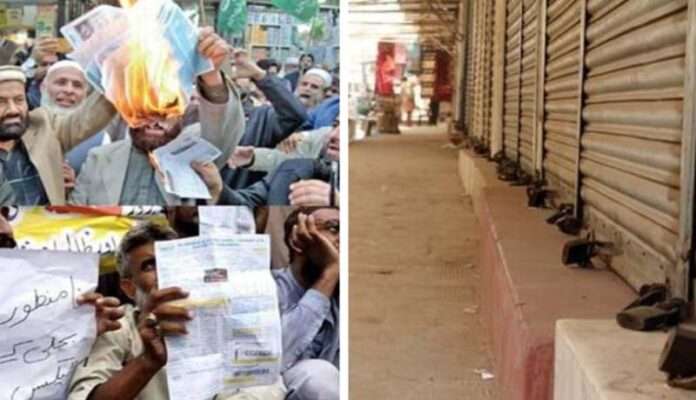Today, businesses across the nation are participating in a shutter-down strike as a result of high electricity costs and inflation that have both reached record highs.
The strike is an extension of the ongoing protest demonstrations being organised by citizens and business owners in different cities. People have been protesting recent price hikes and inflated bills on the streets, fuelled by their annoyance with inflated power bills.
The base unit power tariff increased last month from Rs24.82 to Rs29.78 due to an increase in the national average tariff of about Rs5 per unit by the power regulator. On August 22, the government attempted to increase the price of electricity by Rs3.55 per unit.
Caretaker Prime Minister Anwaarul Haq Kakar, however, described the outrage as a “non-issue” when speaking with journalists a day ago and insisted that some political parties were using it as a “tool” in their election campaigns.
The interim prime minister had said to senior journalists and news anchors on Friday that the issue was not very serious but that political parties were using it as a social cause because they were in election mode.
Jamaat-i-Islami also requested traders and residents to take part in today’s strike in Karachi in opposition to the rising cost of living earlier this week.
JI spokesperson Zahid Askari told Dawn.com that the strike was being carried out “peacefully” today. He mentioned the voluntary suspension of transporter operations.
Askari added that there was little to no transport on the roads as a result of the strike call and that none of the party members were using violence to force the closure of any businesses in the city.
The chairman of All Karachi Tajir Ittehad (AKTI), Atiq Mir, also said that his organisation had called for a two-day shutter-down strike yesterday and today in protest of the exorbitant electricity prices and the general rise in inflation.
The shopkeepers were also informed that the strike was voluntary, acknowledging the financial hardships we are all experiencing at the moment, he told Dawn.com.
Markets were currently closed, according to Mir, and the full impact of the strike would become apparent in the afternoon, when businesses would normally reopen in accordance with the city’s cultural customs.
Sindh CM calls for peace
Retired Justice Maqbool Baqar, the interim chief minister of Sindh, acknowledged the difficulties faced by the populace and reaffirmed that holding protests was a fundamental democratic right.
The chief minister said in a statement that those taking part in the protest should be careful not to annoy their fellow citizens.
He added that both the provincial and federal governments were making efforts to lessen the burden on the populace.
The provincial chief executive advised that “the authorities should also take proactive measures to maintain a peaceful atmosphere during the protest.”
Parts of KP are on strike
To protest the rising cost of electricity, traders and transporters in the Malakand and Hazara divisions called for the closure of markets and a halt to all transportation.
In several places throughout the morning, including Shangla, Bisham, Alpuri, Puran, Swat, Mingora, Khwazakhela, Barikot, Dir Timergara, Warai, as well as in Malakand, Butkhela, and Dargai, traders have shut down their operations. Parts of the Hazara division, Kohistan, Battagram, Mansehra, Abbottabad, Haripur, and other regions have also been impacted by the strike; retailers have closed their stores, and transporters have parked their trucks.
The Shangla trade union’s president, Shujat Ali, bemoaned the fact that authorities have consistently hurt their businesses throughout history.
He complained that commitments made to international organisations like the IMF were now endangering the lives of people who were so poor that they were on the verge of suicide.
He told Dawn.com that because they were unable to pay their families’ basic needs or even electricity bills, they were forced to close all of the district’s markets.
A transport union’s president, Sultan Khan, claimed that they had no choice but to strike as a result of the government’s actions. He emphasised that it was time to force the government to have mercy on the oppressed masses because people had used up all of their resources and sold off their family’s possessions, leaving them with nothing but hopelessness and suicidal thoughts.
The JI also had separate demonstrations and protests scheduled for this afternoon.
Divergent responses in Peshawar
Despite business closures in various KP regions, Peshawar’s reaction seemed conflicted. Some businesses opted to remain closed, while others decided to remain open.
During a visit to Peshawar’s Ashraf Road, a reporter for Dawn.com observed that more than half of the market was open, with only a few stores closed. It’s important to note that this neighbourhood functions as a central market and sees a lot of daily traffic.






